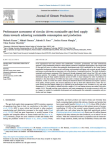Kumar M., Sharma M., Raut R.D., Mangla S.K., Choubey V.K. (2022). Performance assessment of circular driven sustainable agri-food supply chain towards achieving sustainable consumption and production. Journal of Cleaner Production, 20/10/2022, vol. 372, p. 1-16.
https://doi.org/10.1016/j.jclepro.2022.133698
https://doi.org/10.1016/j.jclepro.2022.133698
| Titre : | Performance assessment of circular driven sustainable agri-food supply chain towards achieving sustainable consumption and production (2022) |
| Auteurs : | M. Kumar ; M. Sharma ; R.D. Raut ; S.K. Mangla ; V.K. Choubey |
| Type de document : | Article |
| Dans : | Journal of Cleaner Production (vol. 372, October 2022) |
| Article en page(s) : | p. 1-16 |
| Langues : | Anglais |
| Langues du résumé : | Anglais |
| Catégories : |
Catégories principales 11 - COMMERCE ; 11.1 - Commerce (général ou théorique)Thésaurus IAMM SYSTEME AGROALIMENTAIRE ; CHAINE D'APPROVISIONNEMENT ; DURABILITE ; ECONOMIE CIRCULAIRE |
| Résumé : | Food organizations have seen pressure from stakeholders, consumers, governments, and other international agencies to adopt sustainable practices in their business operations. Sustainable development is the current need for the agri-food sector to achieve the sustainable development goals (SDG) established by the United Nations. Sustainable development improves social well-being, environmental well-being, and economic growth. Regular performance monitoring plays an important role in the adoption of sustainable practices. This study developed a sustainable performance assessment (SPA) framework through integrated triple bottom line (TBL) and circular economy practice. The weights of sustainable dimensions and key performance indicators (KPIs) have been determined using the fuzzy analytic hierarchy process (F-AHP). A fuzzy technique for order of preference by similarity to the ideal solution (F-TOPSIS) has been used to evaluate sustainable performance and rank the alternatives. A total of 16 KPIs were used to develop the framework drawn from literature and experts' opinions. Food quality, revenue growth, and resource utilization are the top three KPIs obtained from F-AHP. The economic factors have the highest weights (0.4), followed by the environment (0.34), circulation (0.16), and social dimensions (0.1). Food quality is ranked first with a weight of 0.16, and human resources are ranked 16th with a weight of 0.01. Through recycling, waste reduction, and waste management, the circular economy in AFSC acts as a support or catalyst for sustainable development and reaching goals like sustainable consumption and production and zero hunger. |
| Cote : | Réservé lecteur CIHEAM |
| URL / DOI : | https://doi.org/10.1016/j.jclepro.2022.133698 |







